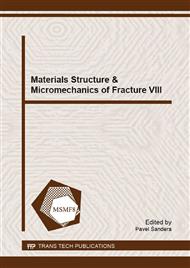p.102
p.106
p.110
p.117
p.125
p.131
p.137
p.141
p.145
Alloying-Driven Phase Stability in Group-VB Transition Metals under Compression
Abstract:
The change in phase stability of Group-VB transition metals (V, Nb, and Ta) due to pressure and alloying is explored by means of first-principles electronic-structure calculations. It is shown that under compression stabilization or destabilization of the ground-state body-centered cubic (bcc) phase of the metal is mainly dictated by the band-structure energy. In the case of alloying the change in phase stability is defined by the interplay between the band-structure and Madelung energies. We show that band-structure effects determine phase stability when a particular Group-VB metal is alloyed with its nearest neighbors within the same d-transition series: the neighbor with less and more d electrons destabilize and stabilize the bcc phase, respectively. When V is alloyed with neighbors of a higher (4d- or 5d-) transition series, both electrostatic Madelung and band-structure energies stabilize the bcc phase. Utilizing the self-consistent ab initio lattice dynamics approach, we show that pressure-induced mechanical instability of bcc V, which results in formation of a rhombohedral (rh) phase at around 60-70 GPa at room temperatures, will prevail significant heating and compression. Furthermore, alloying with Cr decreases the temperature at which stabilization of the bcc phase occurs at elevated pressure.
Info:
Periodical:
Pages:
125-130
DOI:
Citation:
Online since:
December 2016
Authors:
Price:
Сopyright:
© 2017 Trans Tech Publications Ltd. All Rights Reserved
Share:
Citation:


